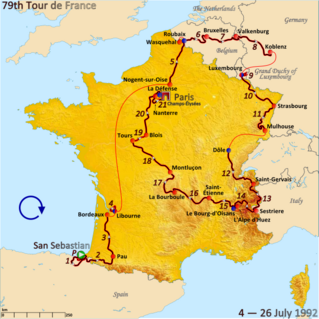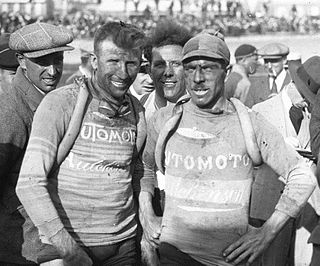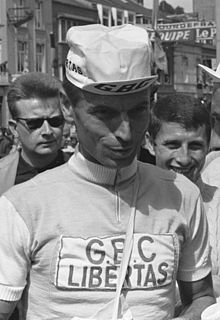
Lotto–Soudal is a Belgian professional cycling team at UCI WorldTeam level sponsored by the Belgian lottery and Soudal, an adhesives and sealants manufacturer. For the 2016 and 2017 editions of Paris–Nice, and the 2018 Giro d'Italia, the team raced under the name Lotto Fix ALL, and in a different colour of kit, to promote a particular product from the Soudal range. The same organisations also sponsor a women's cycling team, Lotto–Soudal Ladies.

The 1992 Tour de France was the 79th edition of the Tour de France, taking place from 4 to 26 July. The total race distance was 21 stages and a prologue over 3,978 km (2,472 mi). In honor of the Maastricht Treaty, which created the European Union, the Tour visited a record seven countries: France, Spain, Belgium, the Netherlands, Germany, Luxembourg and Italy.
CCC Liv is a women's professional cycling team, based in the Netherlands. The title sponsors are CCC, a Polish-based shoe retailer and Liv, a sub-brand of Taiwanese bicycle manufacturer Giant Bicycles. The team's directeur sportif is Jeroen Blijlevens. Riders for CCC Liv compete in the UCI Women's World Tour and other Elite Women's Cycling events throughout the world.

Chateau d'Ax was an Italian professional cycling team that existed from 1983 to 1993, when it was succeeded by Team Polti. Among its various sponsors was Chateau d'Ax, an Italian furniture manufacturer.

Groene Leeuw was a Belgian professional cycling team that existed from 1945 to 1969. Its main sponsor was Belgian bicycle manufacturer Groene Leeuw. Among the various co-sponsors was the Belgian beer Wiel's. In the 1960 Vuelta a España, the team finished with the top two placings in the general classification of the 1960 Vuelta a España, with Frans De Mulder first and Armand Desmet second.

Saint-Raphaël was a French professional cycling team that existed from 1954 to 1964. Its main sponsor was French apéritif brand Saint-Raphaël. From 1959 to 1961, a sister team existed, Rapha–Gitane–Dunlop.

Solo–Superia was a Belgian professional cycling team that existed from 1961 to 1966. Its main sponsor was Belgian margarine manufacturer Solo. Its most notable wins were the 1965 Paris–Roubaix with Rik Van Looy and the 1966 Tour of Flanders with Edward Sels.

Automoto was a French professional cycling team that existed from 1910 to 1952. Its main sponsor was French bicycle and motorcycle manufacturer Automoto. The Automoto cycling team rose to its fullest prominence in the peloton after World War One. Its riders dominated professional cycling's premier event, the Tour de France, from 1923-1926 with a series of convincing victories captained by riders with international appeal like Henri Pellisier (France), Ottavio Bottecchia (Italy) and Lucien Buysse (Belgium).

Ignis was an Italian professional cycling team that existed from 1955 to 1968. Its main sponsor was Italian home appliance maker Ignis. The team won the team classification of the 1960 Giro d'Italia.

Dr. Mann was a Belgian professional cycling team that existed from 1960 to 1970. Its main sponsor was proprietary medicine producer Dr. Mann. Its most notable victory was Herman Van Springel's win of the 1968 Giro di Lombardia.

Willem II–Gazelle was a Dutch professional cycling team that existed from 1966 to 1971. Its main sponsor was Dutch cigar maker Willem II and the co-sponsor was bicycle manufacturer Gazelle. Their most successful rider was Rik Van Looy, whose most notable wins with the team were the 1967 Paris–Tours, the 1968 La Flèche Wallonne and the 1969 E3 Prijs Vlaanderen. Harry Steevens won the 1968 Amstel Gold Race with the team.

Frisol was a Dutch professional cycling team that existed from 1973 to 1977. Its main sponsor was Dutch oil trader Frisol. Its most notable victory was Jan Raas's win of the 1977 Milan–San Remo.

Fagor was a French professional cycling team that existed from 1985 to 1989. Its main sponsor was Spanish domestic and commercial appliance manufacturer Fagor.

La Redoute was a French professional cycling team that existed from 1979 to 1985. Its main sponsor was French mail order company La Redoute, with French bicycle manufacturer Motobécane a co-sponsor between 1979 and 1983.
IJsboerke was a Belgian professional cycling team that existed from 1973 to 1982. Its main sponsor from 1973 to 1980 was Belgian ice cream manufacturer IJsboerke. In 1981 and 1982, its main sponsor was juice drink brand Capri Sun. Walter Godefroot won the 1978 Tour of Flanders with the team.

Libertas was a professional cycling team that existed from 1952 to 1967. Its main sponsor was Belgian bicycle manufacturer Libertas.
Tulip Computers was a Belgian professional cycling team that existed from 1990 to 1992. Its main sponsor was Dutch computer manufacturer Tulip Computers. This team should not be confused with the Spanish cycling team sponsored by Tulip Computers in 1990.
Boule d'Or was a Belgian professional cycling team that existed from 1979 to 1983. Its main sponsor was cigarette brand Boule d'Or.
The 1992 Critérium du Dauphiné Libéré was the 44th edition of the cycle race and was held from 1 June to 8 June 1992. The race started in Charbonnières-les-Bains and finished in Villard-de-Lans. The race was won by Charly Mottet of the RMO team.
The 1989 GP Ouest-France was the 53rd edition of the GP Ouest-France cycle race and was held on 22 August 1989. The race started and finished in Plouay. The race was won by Jean-Claude Colotti of the RMO team.

















